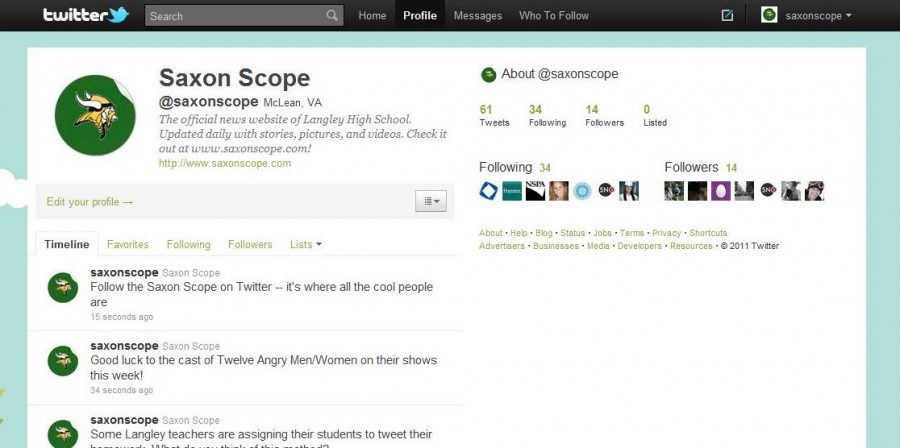These days, the students of our generation are considered a part of the ‘digital age. Through all the facebook status updates, tweets, blogs, and texts, Langley students certainly fit this description. But now, these media for technology are being brought into school, through various academic assignments.
Juniors in AP Language/Composition experience this learning through technology with Ms. Ludwig’s “Hemingway and Twitter: Word Economy” assignment. Ms. Ludwig posts tweets through her twitter asking questions about the author Ernest Hemingway and various passages of his work. Students then tweet back (through their own twitter accounts created for the assignment) responses to her questions.
“Twitter only lets you write 140 characters, so it teaches students how to write interesting yet concise sentences to respond, like Hemingway’s writing style,” said Ms Ludwig when describing the twitter assignment’s benefit for students. She also mentioned with the quickly approaching process of applying to college for juniors, the twitter assignment helps students develop the necessary skills for these procedures, since some colleges will only accept a certain amount of words on each application.
Approval of the twitter assignment is apparent within the junior class. Katelyn Margraf mentioned that the assignment is good because it “uses technology to teach in school.” Audrey McNicholas also approved of the assignment, saying that it “forces you to say more with less.” Ludwig calls this project a “perfect medium” for members of the digital age in junior year. It’s not only the juniors that are receiving the benefits of technology within their assignments.
Another technological assignment is the Wikis that freshmen in Honors English 9 use. Students read a passage and answer questions on various HTML style pages, similar to the twitter assignment. Different wikis focus on different reading skills like figurative language, themes, or diction.
Teacher Vivian Jewell supports this integration of technology into school. “Wikis attempt to end some of the isolation that students traditionally experience while doing homework. Wikis allow homework to be interactive, and allow assignments to become dynamic.”
Maybe someday students can feel motivated by homework through technology. This process has been working so far. “Students who are engaged in their homework and who enjoy it are more likely to learn something in the process,” said Ms. Jewell.
This idealistic and optimistic view of technology in school, whether through twitter or wikis, shows a possibility for more involvement in the future. It presents a possibility that the Saxons of the technologically savvy digital age, may someday find a perfect balance between school and the computer, when the thing that seemed to be distracting them becomes the actual assignment.


